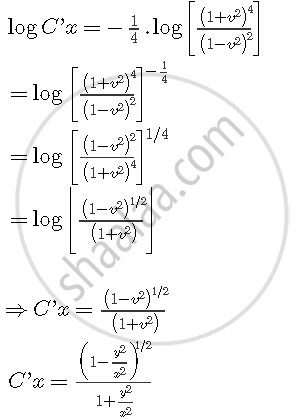Advertisements
Advertisements
प्रश्न
Prove that x2 – y2 = c(x2 + y2)2 is the general solution of the differential equation (x3 – 3xy2)dx = (y3 – 3x2y)dy, where C is parameter
उत्तर
The given equation is:
(x3 – 3xy2)dx = (y3 – 3x2y)dy
`=> (dy)/(dx) = (x^3 - 3xy^2)/(y^3 - 3x^2y)`
which is a homogeneous equation.therefore substituting y=vx




संबंधित प्रश्न
Show that the differential equation 2yx/y dx + (y − 2x ex/y) dy = 0 is homogeneous. Find the particular solution of this differential equation, given that x = 0 when y = 1.
Show that the given differential equation is homogeneous and solve them.
`x dy - y dx = sqrt(x^2 + y^2) dx`
Show that the given differential equation is homogeneous and solve them.
`{xcos(y/x) + ysin(y/x)}ydx = {ysin (y/x) - xcos(y/x)}xdy`
For the differential equation find a particular solution satisfying the given condition:
(x + y) dy + (x – y) dx = 0; y = 1 when x = 1
For the differential equation find a particular solution satisfying the given condition:
`dy/dx - y/x + cosec (y/x) = 0; y = 0` when x = 1
Find the particular solution of the differential equation `(x - y) dy/dx = (x + 2y)` given that y = 0 when x = 1.
Solve the following initial value problem:
\[x e^{y/x} - y + x\frac{dy}{dx} = 0, y\left( e \right) = 0\]
Solve the following initial value problem:
x (x2 + 3y2) dx + y (y2 + 3x2) dy = 0, y (1) = 1
Solve the following initial value problem:
\[x\frac{dy}{dx} - y + x \sin\left( \frac{y}{x} \right) = 0, y\left( 2 \right) = x\]
Find the particular solution of the differential equation \[\left( x - y \right)\frac{dy}{dx} = x + 2y\], given that when x = 1, y = 0.
Show that the family of curves for which \[\frac{dy}{dx} = \frac{x^2 + y^2}{2xy}\], is given by \[x^2 - y^2 = Cx\]
A homogeneous differential equation of the form \[\frac{dx}{dy} = h\left( \frac{x}{y} \right)\] can be solved by making the substitution
Solve the following differential equation:
`(1 + "e"^("x"/"y"))"dx" + "e"^("x"/"y")(1 - "x"/"y")"dy" = 0`
Solve the following differential equation:
`"x"^2 "dy"/"dx" = "x"^2 + "xy" + "y"^2`
Solve the following differential equation:
(9x + 5y) dy + (15x + 11y)dx = 0
Solve the following differential equation:
(x2 – y2)dx + 2xy dy = 0
State whether the following statement is True or False:
A homogeneous differential equation is solved by substituting y = vx and integrating it
State the type of the differential equation for the equation. xdy – ydx = `sqrt(x^2 + y^2) "d"x` and solve it
F(x, y) = `(ycos(y/x) + x)/(xcos(y/x))` is not a homogeneous function.
Solve : `x^2 "dy"/"dx"` = x2 + xy + y2.
A homogeneous differential equation of the `(dx)/(dy) = h(x/y)` can be solved by making the substitution.
The differential equation y' = `y/(x + sqrt(xy))` has general solution given by:
(where C is a constant of integration)
